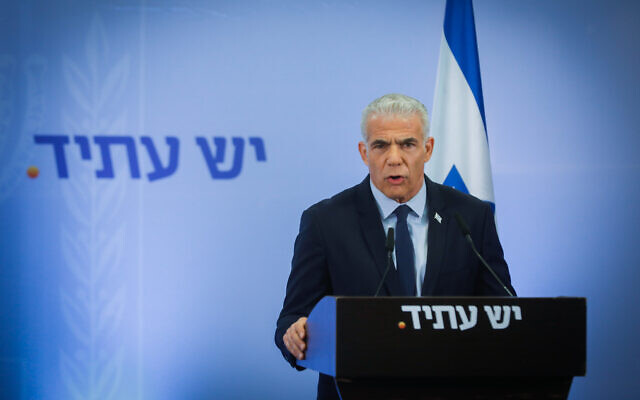Prime Minister Benjamin Netanyahu was briefed on the looming dangers to Israel ahead of Hamas’s October 7 attack, and was told by defense chiefs that national security was at risk, but willfully ignored “all the red flags, all the warnings,” Opposition leader Yair Lapid charged in an interview with The Times of Israel.
Consequently Netanyahu, who has refused to accept direct overall responsibility as prime minister for the failure to prevent Hamas’s invasion and slaughter, should have resigned on October 8, Lapid said.
The Yesh Atid leader and former prime minister mentioned a specific security briefing at which Netanyahu was present, and which he himself attended in his capacity as opposition leader, referred to “intelligence materials” that Netanyahu and he were shown, and cited what he said were direct warnings delivered to the prime minister by the heads of the IDF.
At the security briefing in the final weeks before the Hamas invasion and slaughter, noted Lapid, “He heard the same things I heard, from General [Avi] Gil, [the prime minister’s military secretary],” Lapid said. “And then I read the intelligence materials that he saw.”
“All the signs, all the red flags, all the warnings” were there, Lapid charged, but Netanyahu “ignored them all.”
Get The Times of Israel’s Daily Edition
by email and never miss our top stories
By signing up, you agree to the terms
So troubled was Lapid by this security briefing, he recalled, that on September 20 he held a press conference at which “I said, something horrible is going to happen. And Gaza was mentioned. And I said, Our parents are going to sit in safe rooms. Our children are going to die.” (Lapid began that press conference — Hebrew link — by declaring, “Ahead of Yom Kippur, I am compelled to warn the citizens of Israel: We are drawing close to a multi-front confrontation…”)

Opposition Leader MK Yair Lapid speaks to the press ahead of his Yesh Atid party’s parliamentary faction meeting in Tel Aviv, September 20, 2023. (Miriam Alster/Flash90)
In the previous government, led by him and Naftali Bennett, Lapid added, “We were alert, and there was no way on earth that if the chief of staff and his senior generals, had come into the room — as happened with Netanyahu — and said, ‘You’re risking Israel’s security; your judicial reform is actually undermining our deterrence because our enemy sees this as an opportunity,’ that I or [Bennett] would ignore it.”
Added Lapid: “This is why it wouldn’t have happened on our shift — and this is why he shouldn’t have been prime minister since October 8.”
Regarding the continuing indirect negotiations with Hamas on a hostage-ceasefire deal, Lapid accused Netanyahu of stalling in order to keep far-right parties from bolting his coalition, and said the prime minister’s recent insistence on an ongoing Israeli presence along the Philadelphi Corridor between Gaza and Egypt was a pretext.
“The war started on October 7. He, as the prime minister, sent troops to the Philadelphi Corridor in May. That is almost eight months afterwards,” he noted. “For eight months, you didn’t think the Philadelphi Corridor is the most important thing. All of a sudden, this is the only thing that matters. I’m not saying that the Philadelphi Corridor is not important. It is important. [But] it is way more important to finalize the hostage deal.”
Such a deal “will also calm the north,” argued Lapid. “But more than that, Israeli society will never heal unless the hostages are back. And we can actually use the break [from fighting] to rebuild and reshape Israeli society and the army for the challenges we face — and make sure everybody understands that now we have an ability to be more proactive about what is going on up north — not to mention Iran, which has always been the biggest challenge. And this [hostage deal] is also the only path toward the regional coalition that is essential to [dealing with Iran].”
Lapid in the interview insisted that Israel, post-Netanyahu, can return to being “what we were supposed always to be. We can be happy, we can be optimistic, we can be hopeful. We can be functional — which we are not right now.”
But first, he reiterated, Netanyahu has to go. “The thing that matters about Netanyahu is that he’s not working for the country,” said Lapid. “He’s interested in power per se and not the power to do good.”
“The fact that Netanyahu is saying things about unity or divisiveness doesn’t matter. You have to look at what he’s doing, and what he’s doing right now is not making the hostage deal that he should be, not building the budget for the good of everybody. He doesn’t respect the sacrifices this country is making. He’s flying around in this private jet. He hasn’t been to one kibbutz since October 7. So he cannot tell me that he’s for the country. He’s for himself.”
ToI interview – ‘He lost his soul’: Lapid sees ‘sacred cause’ in toppling Netanyahu’s government
pdcc